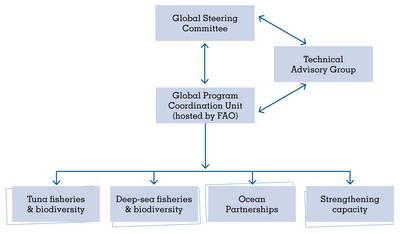Program, Structure and Goals
The Common Oceans ABNJ Program
The Global sustainable fisheries management and biodiversity conservation in the Areas Beyond National Jurisdiction (ABNJ) Program – commonly referred to as the Common Oceans ABNJ Program – is funded by the Global Environment Facility (GEF) and coordinated by the Food and Agriculture Organization of the United Nations (FAO) in close collaboration with two other GEF agencies, the United Nations Environment Programme and the World Bank, and other partners.
Focusing on tuna and deep-sea fisheries, in parallel with the conservation of biodiversity, the Program aims to promote efficient and sustainable management of fisheries resources and biodiversity conservation in the ABNJ.
Having started its activities in 2014, the Program offers an innovative and comprehensive initiative working with a unique variety of partners. It consists of four Projects that bring together governments, regional management bodies, civil society, the private sector, academia and industry that work to ensure the sustainable use of ABNJ resources and to achieve global targets agreed in international.
The Organizational Structure
FAO, serving as the Global Coordinator of the four Projects that make up the Program, is supported by a Global Steering Committee comprised of representation from key partners, and a Technical Advisory Group made up of scientific and technical experts that work to ensure participation and full involvement of key partners from the policy, technical, and scientific communities as well as industry.
Click the diagram below for larger image.
The Program concentrates on short-term milestones as part of a long-term plan to establish the strong networks, best management practices and facilitated information sharing needed to make a transformational impact towards responsible and sustainable use of ABNJ resources. In summary, it aims to:
- move towards the ecosystem approach and rights-based systems and away from the "race to fish";
- increase our ability to protect fragile ecosystems;
- foster international and cross-sectoral coordination and sharing of information.

